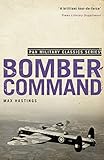The Art of Electronics, and especially the student manual that accompanies it. I read these a long time ago, and at the time it was a pretty good introductionto electronics, especially if you bought some cheap second hand test equipment and had a few breadboards and components to do the lab work. I'm not sure if it's aged well. There are a bunch of people on HN who still do electronic work who could recommend better newer books.
https://www.amazon.co.uk/Bomber-Command-Pan-Military-Classic...
https://www.amazon.com/Bomber-Command-Zenith-Military-Classi...
The book talks about the change in tactics. At the beginning of the war targeting civilian areas was clearly a war crime; by the end of the war we had things like Dresden.
> And because it had led the AAF to organize its raids during the day, when its bombers were easy for German fighter pilots to find and shoot down, casualties in the bomber force during 1942 and 1943 were shockingly high; in one raid alone, the October 14, 1943 attack on the ball-bearing plants at Schweinfurt (see https://en.wikipedia.org/wiki/Second_Raid_on_Schweinfurt), 26% of the attacking bombers were shot down.
Most people don't understand just how high the casuality rates were. The RAF bomber command lost about 55,000 men of 125,000 total.
Max Hastings has a good book: https://www.amazon.co.uk/Bomber-Command-Pan-Military-Classic...
I mention it because the book talks about the problem they had with targeting, and refinements they made.
It also talks about the change in attitudes about targeting civilians, from being a war crime that must be avoided at the beginning, to being the only thing that could stop the war at the end.
The change in attitude throughout the war, starting from a position of "do not bomb civilians" and ending with "fire bomb civilian populations to kill as many civilians as possible, in a probably horrible way" is covered nicely in Max Hastings' book "Bomber Command".
http://www.amazon.co.uk/Bomber-Command-Pan-Military-Classics...
http://www.amazon.com/Bomber-Command-A-Touchstone-book/dp/06...
(Why are US book covers so weird?!)
Wikipedia has a tl;dr https://en.wikipedia.org/wiki/RAF_Bomber_Command
English Bomber Command suffered heavy losses. About 55,000 aircrew died, of a total about about 125,000 men. (That's around a 44% death rate, which is uncomfortably close to a coin-toss.)
With bombing someone is making the choice to kill civilians. At least with drones they're trying (perhaps not hard enough) to avoid killing civilians.
The book "Bomber Command" (Max Hastings) talks a little bit about the changing policy in WWII from "Do not kill civilians" to "Let's carry out horrific firebombing of German cities". (Also the death rate of bomber crews was shockingly low.)
http://www.amazon.co.uk/Bomber-Command-Pan-Military-Classics...
(Wait what? Is that a referral link? I don't think I have any kind of referral stuff set up with amazon?)


The humour is subversive, the illustration is lovely, and these ("This is not my hat" is another) are great books for younger children. My child loved it, and the people I've given this to have gone on to buy other books by the writer or illustrator.
"Mr Birdsnest and the House Next Door": https://www.amazon.co.uk/Birdsnest-House-Next-Door-Little/dp...
Little Gems are a set of books printed on reduced contrast paper, with a large clear font. They're short, simple, but fun. They're good for younger readers or for slightly older reluctant readers. My child enjoyed reading this book, and loved the illustration. The other child I gave this to took out other books in the Little Gems series from the library, and bought other Julia Donaldson books with her pocket money.
"Code: The Hidden Language of Computer Hardware and Software" https://www.amazon.co.uk/Code-Language-Computer-Hardware-Sof... I had a friend who knew a lot about the software, and knew a lot about hardware but their hardware knowledge was a bit patchy. Code helped solidify their knowledge. If I could have afforded it I would have given them The Art of Electronics and the companion Student Manual. (This was in the 1990s. I haven't read the new version and I don't know how well it works today.)
"Bomber Command" https://www.amazon.co.uk/Bomber-Command-Pan-Military-Classic... I liked this book because it describes how we (the UK) went into world war 2 with ethical notions around not bombing civilian populations and ended up fire-bombing several heavily populated German cities. It's also eye-opening about the scale of this part of the war, and the cost in lives of aircrew.